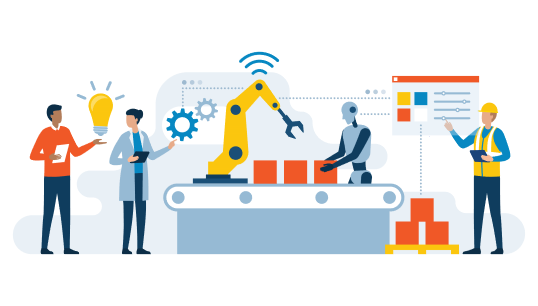
Big changes are on the horizon in terms of green technology, automation and regulation – but how will these trends actually affect maritime professionals on the job over the next 20 years? Rob Coston takes a look
Futurist Gerd Leonhard has a positive message for those who work aboard: 'I think the job of being a seafarer is going to become attractive again.'
This is also a positive message for the maritime industry, which is coming to terms with a predicted shortage of officers as revealed in the 2021 edition of the International Chamber of Shipping's Seafarer Workforce Report – an additional 17,902 need to join the workforce each year to keep up with demand, but retention is dropping due to poor conditions aboard during the Covid crisis.
One reason that things might start to improve is connectivity, according to Mr Leonhard, who spoke about the future of maritime at the 2021 London International Shipping Week (LISW). This will be needed for the increased use of services aboard such as real-time monitoring and remote inspection, but will provide new opportunities for crew as well.
'It has been a very specialised thing; you would do this job if you could tolerate being lonely, but in the next 10 years there'll be very few places left we cannot connect, not just from 5G but because of all the satellite projects. Connectivity becomes like water, or like sunshine. We're going to have a multimedia environment where you can work on a ship and then go to a room to meet your family with seamless video communication – you're still gone, but it will be much better than what you have now.'
Feeling more connected to loved ones is just a small part of the way in which the experience of being a seafarer is likely to change over the next few years – and the transformation is already beginning.
When will the changes occur?
David Appleton, Nautilus International's head of professional and technical, runs through some of the technologies that are already making an impact because of connectivity. 'Generally, there's a trend towards remote monitoring – engine manufacturers can monitor engine performance on a ship; companies definitely know where their ships are at any given time and give feedback to seafarers. The London Hydrographic Office is talking about the new standards for electronic charts and how they can be updated live with the connectivity you have now, so rather than updating every two weeks you can have live information on tides, currents and wind.'
He also highlights the fact that Nautilus members in particular are likely to work in the high-technology, skilled areas of the maritime profession and are therefore going to be exposed to change earlier than some other seafarers.
Mr Leonhard is bullish about when further changes will occur – not just in connectivity but other areas too. He points out that technological change is exponential – meaning that we are likely to see very rapid uptake of green and IT technologies that have been gradually developed over the past decade.

Mr Leonhard also foresees rapid social change, as companies increasingly have to deal with regulatory and public pressure over pollution and mistreatment – which translates into shortages of staff and difficulty raising investment.
This is likely to lead to rapid adoption of a whole range of new fuels, which will require seafarers to become familiar with different technologies for different vessels.
Another question is how evenly distributed this future will be. Given the lifespan of the average vessel, could we see newer ships outfitted with the latest technology but older ships still chugging along on heavy fuel oil and with poor connectivity?
'Someone is going to be using a ship for 35 years if it hasn't sunk,' says Mr Appleton. 'Regulations tend to apply when you build the ship, so while seafarers on newer ships might see advances, those on 20-23 year-old ships will be using 20-30 year-old technology.'
'I think for shipping companies to say they're going to leave the old ships as they are is just not going to work; they're going to have to upgrade and seriously invest to attract more people and to meet targets for the energy transition,' says Mr Leonhard. In terms of polluting vessels, for example, major businesses are now beginning to try decarbonising their entire supply chain – recently Unilever has begun pressuring suppliers to reduce emissions by 50%, for example – which will have a knock-on effect on shipowners.
Automation – changing the job
Automation is obviously a major change, but at LISW, Mr Leonhard said that he believes this will not result in a large-scale further reduction in the workforce.
Instead, it will change the nature of the work in some surprising ways. The question is not if we're going to have 40 people or 25,' he says. 'In the end, I think the jobs that people will do will be much more multivariate. Now, everybody is a specialist, but technology will change that – everybody will need to be capable of doing most things, so the engineer will also be fixing the electronics, and the cargo manager is now also the IT manager for the port procedure.'
This will be enabled by automated systems and virtual environments – accessible remotely or from the bridge – that make each part of the formerly specialist work easier and more accessible, so that seafarers will have more time and ability to work across different domains.
'You will not be in a position to just say "well, I just do this one thing". You always end up learning new things – and you will be able do that onboard, too.'
Parts of the job that are 'dangerous, dull or dumb' are most likely to be automated away, but non-routine work – both intellectual and manual – will still flourish. A robot is unlikely to be able to perform even basic repairs, and artificial intelligence is unable to plot a safe course in the same way a human can. While automation is viable in controlled environments – like warehouses – it is far less capable where there are a lot of variables, with AI unable to perform some jobs that seem simple to us.
'People think that routines are easily done by machines. Like docking a ferry – yeah, it looks easy, you've done it 1,000 times. It's easy for a human but it's actually very hard for machines. The best possible computer vision only reaches 3% of the potential of the human eye, and humans don't just see; we can smell danger, so to speak.'
Mr Appleton agrees that automation will not replace seafarers: 'I think there will be more complicated systems, but the idea of fully automated ships on deep sea routes is a long way away, not just technologically but because the business case isn't there,' he says. 'What there is a business case for is things which are not economical to do with a crew, like 24-hour surveying.'
Who joins the profession?
Will these changes to the nature of the job change the kind of person who chooses to become a seafarer? Will more technical – and IT-focused – roles attract the sort of person who gets a computer science degree rather than school-leavers looking for adventure?
'It might be more attractive to people that are a little bit nerdy,' smiles Mr Appleton. 'And then, of course, you have people who may be interested in the manual work; craftspeople have a great future onboard.'
Changes to learning may also make it easier for people who have not had access to a traditional, quality maritime education to get the training that they need to improve on the job.
Echoing recent mental health initiatives for the maritime industry, Mr Leonhard wonders if shipping becoming more efficient will free up money so that companies will pay for people onboard who focus on the social side – experts in relationships who can take on some of the pastoral role of the captain. However, Mr Appleton is more sceptical of this – in fact, he worries that conditions could actually deteriorate.
'There's no positive trend on the social side,' he says. 'Despite all the problems around fatigue and working hours, it definitely hasn't followed the same path as on green transformation. I think that's due to visibility – everyone is aware of what's going on with pollution and carbon and how it affects them, and people see that shipping contributes the same to emissions as a big country like Germany. When it comes to some guys on a ship, I don't think we have that kind of visibility yet.'
'I think there's a risk that if the social issues don't come to the forefront, they could end up getting worse, because if you do end up with fewer people onboard because of digitalisation and automation, then the pressure and isolation will be even worse.'
Lifelong learning
Mr Appleton and Mr Leonhard both agree, however, that maritime training and education will change. Specifically, as vessels and systems become more complex and different from each other, and as technology changes exponentially, there will be a need for more on-the-job vocational and academic learning throughout a seafarer's career rather than front-loaded during cadetship.
Initial training may also need to be focused more on creating the right learning mindset – flexibility and resourcefulness over the long term – than just on specific technical skills.

'What it fundamentally means to be a seafarer won't change,' says Mr Appleton. 'They'll still essentially have the same job, but the technology and the systems they're expected to use are going to become more and more complicated, which will require upskilling of the current workforce and ensuring the people coming into the industry have the soft skills they need to adapt throughout their career.
'The Maritime Skills Commission's report recommended that we should move to full Honours degrees in the UK as the norm for ship's officers – though of course people who don't have one shouldn't be shut out.
'The more complicated a machine is, the more highly qualified you need to be to understand what's gone wrong when it does fail. We'll need highly-skilled seafarers,' says Mr Appleton. 'I don't think the current system is sustainable, where you've got an ETO and that person knows how all the electronic stuff works, but the rest of the crew don't know the basics. You'll need a system-wide understanding of how things go together and how the algorithms work. Seafarers will also need the willingness to change and up their skillset.'
What it fundamentally means to be a seafarer won't change. They'll still essentially have the same job, but the technology and the systems they're expected to use are going to become more and more complicated, which will require upskilling David Appleton, Nautilus International head of professional and technical

Coming soon to your ship
If seafaring is turning into a tech profession, what kind of IT equipment or devices will seafarers be expected to use onboard? We asked master mariner – and Nautilus Champion – Nic Gardner, who is a maritime technology analyst for the Thetius consultancy.
Multimodal drones
What: Remote-controlled craft carrying cameras and sensors that can both fly in the air and act as submarines.
Why: Can be used for checking the draft on both sides of a vessel, which would be safer than using a ladder and boat. Likely to play a part in tank inspections. In underwater mode, could be used for emergency hull inspections in the event of a collision.
When: ROVs (submarine drones) have been used for decades on oil and gas platforms, but multimodal drones such as the US brand Naviator could provide a more flexible solution. I haven't come across them onboard cargo or passenger ships for professional use yet, but many seafarers bring aerial drones along for recreational uses such as photography. I think it will just take a few leading companies to put the devices onboard, and then seafarers will get the hang of the tech very quickly and we'll see them more widely.
Extended reality headsets
What: Also known as virtual or augmented reality, the headset either puts the user in entirely different virtual surroundings or overlays what the user can see in front of them with additional images or information.
Why: This has the potential to greatly improve on existing tech that seafarers use each day. For example, you could have your ECDIS chart in your headset so it overlays what you can see out of the window. And in the case of needing to make urgent onboard repairs, we could have live connections where a seafarer onboard and a tech support person ashore are both wearing headsets.
When: These devices are already being trialled onboard by industry leaders such as Wilhelmsen, and can be bought from maritime tech providers like Fostech and Luminous. Widespread recreational and professional use in land-based settings is bringing the cost down, and I think we could see the devices onboard pretty soon even in smaller companies.
Alternative fuels and propulsion methods
What: Ways of powering a ship that don't involve burning fossil fuels onboard. They include shore-charged batteries, hydrogen fuel cells and wind propulsion devices. It's important to see these alternatives for what they are: new onboard tech that will be operated by seafarers.
Why: Urgently needed to curb vessel emissions and meet carbon reduction targets.
When: Ideally, right now. The industry is starting to commit to a 'green industrial revolution', but it's likely to take a few years to see which alternative propulsion options come out on top and get the right seafarer training in place.
Decision support systems
What: This is essentially artificial intelligence (AI); it's what would be going on in the 'brain' of a fully automated vessel. But it produces a suggestion rather than an action, and the seafarer can choose whether or not to accept.
Why: Some seafarers are wary of anything to do with AI, but with today's small crews and busy shipping lanes, having this additional resource onboard could be very useful for quick decision-making, and could build confidence in AI systems.
When: It's in the trial stage at the moment for onboard use, and it's starting to play a role in remote-controlled vessel operation. Like other onboard tech, I think it's a question of a few leading companies getting it onto their vessels. If it works well – and especially if it saves the company money in some way – we could really see it taking off.
Is any of this tech already onboard your ship? What about other new devices? Let us know what you think of them in a letter to the editor: telegraph@nautilusint.org
- The UK government is seeking seafarer input on proposed changes to the rules around maritime automation. The consultation closes on 22 November 2021.
Tags
More articles
The new way to survey – how uncrewed vessels could help map the world's seafloor
The gender benefits of digitalisation in shipping
Simulators: 45 years of development and debate
UK government seeks views on maritime automation
The UK government has launched a new consultation, offering seafarers the opportunity to express their views on regulation affecting autonomous vessels
